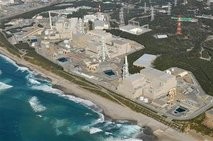Japanese power firm Chubu Electric on Monday agreed to shut a nuclear plant until it can be better defended against the type of massive tsunami that in March triggered the worst atomic crisis in 25 years.
The temporary shutdown of Hamaoka, which supplies power to central Japan -- home to many manufacturers including Toyota Motor Corp -- has added to concerns about power shortages following the crisis at another plant in northeast Japan that was crippled by the March 11 quake and tsunami.
Chubu's decision was in response to an unprecedented request by Prime Minister Naoto Kan last week to halt all reactors still operating at Hamaoka, citing the high risk that a powerful earthquake would hit the region in coming years.
In an announcement that could add to public concern in the quake-prone country, another operator -- Japan Atomic Power -- said it had plugged a tiny radiation leak at its Tsuruga plant on the west coast, the first since it started operations in 1987. It said the leak had no impact on the environment.

Japan's trade and industry minister Banri Kaieda said the shutdown of Hamaoka, 200 km (120 miles) from Tokyo, was a special case because of its location, and reiterated that other plants would not be singled out for closure.
A close aide to Prime Minister Naoto Kan -- who pushed for the shutdown -- said further action would be taken if other plants were judged to pose immediate risk, but added the government had yet to review its long-term energy policy.
"We stood on the safe side and decided to seek a halt at Hamaoka," Goshi Hosono, told reporters. "Long-term debate on nuclear power and energy policy will take place after this."
Officials have acknowledged that the nuclear crisis at Tokyo Electric Power Co's (TEPCO) Fukushima Daiichi plant requires a review of a target to increase nuclear power's share of electricity to 50 percent by 2030 from about 30 percent now.
The reactors at the Hamaoka plant, including the new reactor under construction, were designed by U.S. multinational conglomerate General Electric, just like those at the Fukushima Daiichi plant.
Chubu Electric said the shutdown, which could last about two years until safety steps are completed, would cause short-term trouble for both customers and shareholders. It canceled its annual profit forecast and warned that it could fall the red due to the cost of procuring alternative fuels.
"But firmly implementing measures to strengthen safety would become the cornerstone to continue safe and stable nuclear power in the long-term and in the end lead to the benefit of our customers," Chubu President Akihisa Mizuno told a news conference in Nagoya, where Japan's third-biggest utility is based.
Chubu Electric said it would look to buy more liquefied natural gas and oil to make up for lost capacity, and would make efforts, including procuring energy from another utility in western Japan, to avoid disruptions to its power supply.
AFTER SUMMER
While any power shortfalls may not be large enough to delay Japan's expected economic recovery later this year, the failure of the government to articulate a clear plan for energy policy could exacerbate a hollowing out of the manufacturing sector, analysts said.
The Hamaoka plant provides power to half of the 18 plants that make Toyota vehicles in Japan and all four of Suzuki Motor Corp's domestic car and motorcycle factories.
The coverage area also includes auto plants of Honda Motor Co and Mitsubishi Motors Corp as well as Sharp Corp's Kameyama LCD factory and Toshiba Corp's Yokkaichi semiconductor plant.
The power issues could give exporters another reason -- in addition to a strong yen and cheaper labor abroad-- to shrink production volumes in Japan.
"We can rely on thermal power in the short term, but this raises costs and emissions," said Yasuo Yamamoto, senior economist at Mizuho Research Institute.
"In the future, we're not sure what the government wants to do. The longer that uncertainty about the power supply continues, the more companies will start thinking about manufacturing overseas."
Experts questioned whether the Hamaoka closure marked a turning point in Japan's nuclear power policy following the March 11 disasters, which left nearly 26,000 people dead or unaccounted for and triggered the world's biggest nuclear crisis since Chernobyl in 1986. The plant is still leaking radiation.
The nuclear power industry has considerable political clout with most political parties, including Kan's Democratic Party and its biggest rival, the Liberal Democrats.
"The decision to halt the Hamaoka plant is not based on a clear or legal standard and thus raises concerns about the risk of other plants being asked to halt operations," said Tomomichi Akuta, senior economist at Mitsubishi UFJ Research and Consulting Co in Tokyo.
"The central Japan area has long been said to be prone to big earthquakes but will the government do the same if it finds another location as equally quake-prone? That is not clear. Kan's decision lacked a decision-making process to call it a policy turning point," he added.
Government experts put the chance of a magnitude 8.0 quake hitting the Hamaoka area in the next 30 years at 87 percent, which has raised questions over why it was built there in the first place.
























